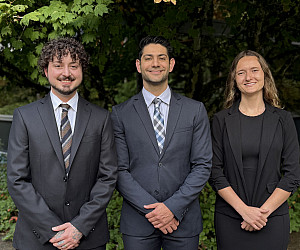Law Student to Present at International Conference in South Africa
When Lewis & Clark Law student Danielle Morvan ’25 takes the stage at an international legal conference in South Africa, she’ll shine a spotlight on how forced arbitration quietly strips vulnerable consumers of their day in court.

This summer, Danielle Morvan ’25 will travel to South Africa to represent Lewis & Clark Law School at the international conference “Aggregate Litigation – Current Challenges for Civil Justice in the Global Perspective,” hosted by the University of Stellenbosch Faculty of Law.
Thanks to generous support from the Dean’s Office and International Law Committee, Morvan’s travel, lodging, and meals will be fully covered with a $3,300 stipend—making this prestigious speaking engagement a fully funded opportunity for international legal scholarship and professional growth.
Morvan was selected through a competitive, anonymized process judged by faculty from Emory Law and Stellenbosch University. Her original research was chosen to be presented at the two-day conference, which will take place June 24–25, 2025, at the Stellenbosch Institute for Advanced Study (STIAS)—located just outside Cape Town in the heart of South Africa’s wine country.
She will be joined by a student from co-sponsor Emory Law School, who was selected through a parallel process. Both students will present alongside an esteemed lineup of international judges, legal scholars, and practicing attorneys discussing global challenges in aggregate litigation, including class actions, case management, and the privatization of dispute resolution.
“This is a huge honor and an extraordinary opportunity for any law student,” said Professor Robert Klonoff, who is co-organizing the conference and will supervise Morvan’s paper. “Danielle’s selection reflects not only the strength of her proposal, but the depth of talent we foster here at Lewis & Clark.”
Morvan’s paper explores how mandatory arbitration clauses and class action waivers—often buried in user agreements and service contracts—disproportionately harm low-income consumers, people of color, and non-native English speakers. Drawing from both legal analysis and personal experience, she argues that these provisions deprive the most vulnerable of access to justice.
“I’m looking forward to learning from an incredible lineup of legal minds and building community among civil justice enthusiasts from around the world,” said Morvan.
Lewis & Clark’s commitment to supporting students in experiential learning and global legal engagement is central to the law school’s mission. As Morvan prepares to take the international stage, she reflects on the journey that brought her here.
“What once appeared as an ancient, rigid legal system, I now see as a highly adaptive legal body,” she said. “My function is to leverage every opportunity I’ve had at Lewis & Clark to effectively promote aggregate litigation as a tool to repair systemic fractures.”
Explore global opportunities through Lewis & Clark Law School’s International Law Program.
Law Communications is located in room 304 of Legal Research Center (LRC) on the law Campus.
MSC: 51
email jasbury@lclark.edu
voice 503-768-6605
Cell: 626-676-7923
Assistant Dean,
Communications and External Relations, Law School
Judy Asbury
Law Communications
Lewis & Clark Law School
10101 S. Terwilliger Boulevard MSC 51
Portland OR 97219
More Stories

Comparative Report to Curb the Expansion of Industrial Animal Agriculture
The analysis of how courts are addressing industrial animal agriculture in four countries is the first of its kind from the Farmed Animal Protection Project of the Center of Animal Law Studies (CALS).

Year in Review
Top Stories of 2025
As the calendar year draws to a close, we’ve compiled a sampling of top stories from the undergraduate college, the graduate school, and the law school.

Justice for Animals and the Environment on a Global Scale
The law school’s Global Law Alliance is helping to advance environmental and wildlife protections across the globe while giving students hands-on experience in international law.

2025-2026 Multnomah Bar Association Fellows Announced
Three 1ls were named as Multnomah Bar Association Fellows: Finn Johnson, Hooman Dadkho, and Christina Smith
